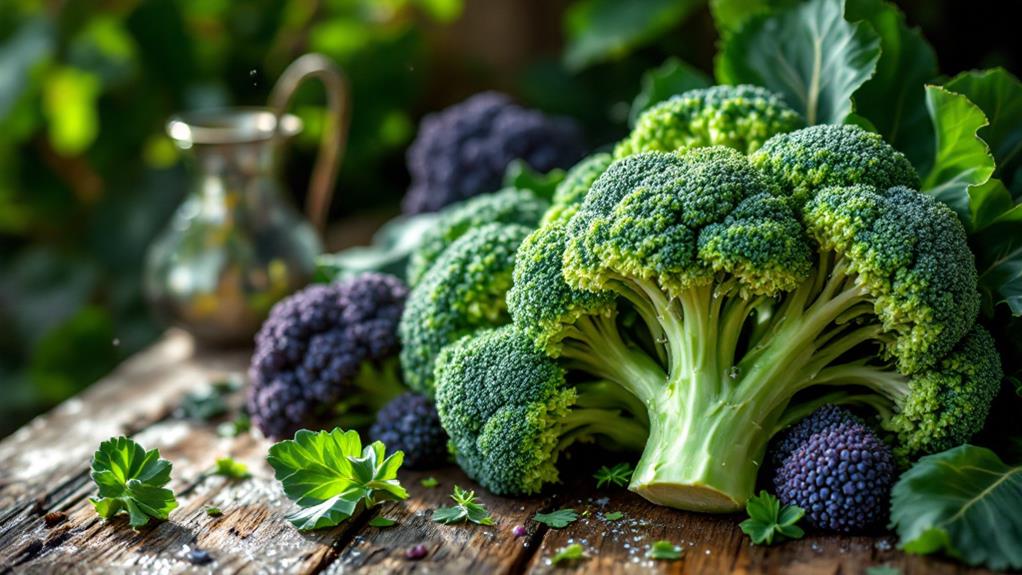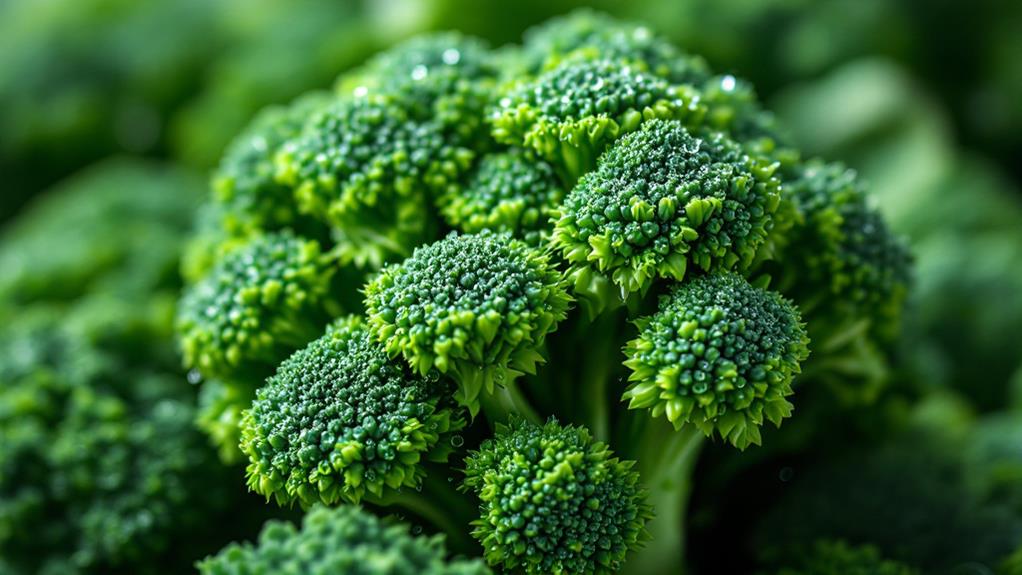Types and Health Benefits of Broccoli: A Cruciferous Superfood

You'll find that broccoli, a cruciferous superfood, offers a range of flavors and nutrients across varieties like Calabrese, Broccolini, and Purple Sprouting. It's low in calories but packed with fiber, vitamins C and K, and vital minerals, making it great for maintaining a balanced diet. The antioxidants and compounds such as sulforaphane play a role in cancer prevention, while its fiber and potassium support heart health and digestion. Regular consumption may also help regulate blood sugar and strengthen immunity. You'll soon see how these powerful features can improve your health and wellness expedition.
Varieties of Broccoli
When you're exploring the varieties of broccoli, you'll find a fascinating array of flavors and textures that cater to different culinary preferences. Calabrese Broccoli is the most common type, featuring large green heads and thick stalks. It's a nutritional powerhouse, rich in vitamins C and K, making it a staple in many dishes. If you're seeking a sweeter flavor, try Broccolini. This hybrid of broccoli and Chinese kale has smaller florets and offers a delightful taste, packed with vitamins A and C, plus ample fiber.
For a splash of color and a lift of antioxidants, Purple Sprouting Broccoli is an excellent choice. Its purple florets and tender stems are high in anthocyanins, providing a unique enhancement to your meals. Romanesco stands out with its striking fractal shape and nutty flavor, rich in vitamin C and glucosinolates, adding both visual and nutritional appeal to your plate.
Chinese Broccoli, or Gai Lan, is prominent in Asian cuisine with its thick, flat leaves and slightly bitter, earthy taste. High in calcium and vitamin A, it enriches dishes with its robust flavor and nutritional benefits. Welcome these cruciferous vegetables for their diverse offerings.
Nutrient Composition
Beyond its lively appearance, broccoli is a nutritional powerhouse packed with vital nutrients. Its nutrient composition is impressive, especially if you're aiming for a balanced diet. With broccoli being composed of 90% water, it ranks high as a low-calorie option, offering just 35 calories per cup. Despite its low calorie count, it's rich in dietary fiber, with 2.2 grams per serving, supporting your digestive health and keeping you full longer.
Vitamin C is abundant in broccoli, providing 135% of your Daily Value per cup. This vitamin not only enhances your immune function but also acts as a potent antioxidant, warding off free radicals. Vitamin K is another standout, with 77% of DV in just one cup, important for bone health and blood clotting.
Broccoli isn't just about vitamins. It contains necessary minerals like potassium, which is vital for heart health and maintaining proper muscle function. You'll also find a moderate amount of protein, folate, magnesium, iron, and calcium, all contributing to different health benefits. By incorporating broccoli into your meals, you can enjoy its numerous nutrients while easily adhering to your dietary goals.
Cancer Prevention Benefits

A significant benefit of including broccoli in your diet is its potential role in cancer prevention. This cruciferous vegetable is a powerhouse of compounds like sulforaphane, known for inhibiting the growth of cancer cells. Regular consumption of broccoli can reduce your risk of developing breast, prostate, and colorectal cancers. Broccoli is packed with glucosinolates, which convert to isothiocyanates during digestion, reducing oxidative stress and inflammation—key factors in cancer progression.
Adding broccoli to your meals can aid in detoxifying harmful carcinogens, thanks to indole-3-carbinol, enhancing your body's natural defenses. The antioxidants in broccoli fight off free radicals, reducing the likelihood of chronic diseases, including cancer. Studies highlight that people who consume more cruciferous vegetables tend to have a lower incidence of lung, stomach, and pancreatic cancers.
Consider these cancer-fighting benefits of broccoli:
- Sulforaphane: Inhibits growth of cancer cells.
- Antioxidants: Protect cells from oxidative damage.
- Glucosinolates: Convert to cancer-fighting isothiocyanates.
- Detoxifying agents: Help eliminate carcinogens.
- Reduced inflammation: Lowers cancer progression risk.
Incorporating broccoli into your diet is a proactive step towards reducing cancer risk and promoting overall wellness.
Heart Health Advantages
With its impressive nutritional profile, broccoli offers several heart health advantages. Packed with antioxidants, it plays a significant role in reducing LDL cholesterol and triglycerides, both of which are essential for lowering your risk of heart disease. By incorporating broccoli into your diet, you can benefit from its high fiber content, which aids in regulating cholesterol levels and improving overall cardiovascular function.
Regular consumption of broccoli has been shown to decrease inflammation markers associated with heart disease, further enhancing its heart health benefits. This means that enjoying broccoli regularly can contribute to a healthier heart by combating inflammation, a common culprit in cardiovascular issues.
Moreover, broccoli contains potassium, a crucial mineral that helps regulate blood pressure. Proper blood pressure management is vital for maintaining cardiovascular health, and broccoli's potassium content can aid in achieving this balance.
Incorporating broccoli sprout supplements into your routine can also support heart health. Studies have indicated significant reductions in triglycerides and LDL cholesterol for those who include broccoli sprouts in their diet. By making this superfood a regular part of your meals, you can actively work towards improved heart health and a more robust cardiovascular system.
Digestive Health Support

Broccoli not only supports heart health but also plays a vital role in maintaining digestive wellness. When you incorporate broccoli into your diet, you're tapping into its impressive fiber content. With about 2.6 grams per 100 grams, broccoli helps promote regular bowel movements and prevent constipation. This fiber is fundamental for nurturing a healthy gut by encouraging the growth of beneficial gut bacteria, which aids in digestion and improves general intestinal function.
The antioxidant properties of broccoli are another reason to include it in your meals. These properties, along with its fiber, contribute to a lower risk of colorectal cancer by maintaining a healthy digestive tract. Furthermore, broccoli is rich in bioactive compounds like sulforaphane, which may enhance your body's detoxification processes, helping eliminate harmful substances from your digestive system.
Here's why broccoli is a must-have for ideal digestive health:
- Supports regular bowel movements
- Prevents constipation
- Fosters a healthy gut environment
- Lowers risk of colorectal cancer
- Improves detoxification processes
Moreover, the fiber in broccoli plays a role in helping regulate blood sugar levels, further contributing to overall digestive health. Enjoying broccoli regularly can greatly benefit your digestive system.
Blood Sugar Regulation
Thanks to its impressive nutritional profile, broccoli plays a key role in blood sugar regulation. It's packed with antioxidants that can improve blood sugar control, making it an excellent choice for individuals with diabetes. These antioxidants work by reducing oxidative stress, which is fundamental for maintaining stable blood sugar levels. Moreover, broccoli's high fiber content is beneficial as it slows down the absorption of sugars into your bloodstream, preventing spikes in blood sugar.
A study even found that consuming broccoli sprouts daily can greatly decrease insulin resistance. This suggests that including broccoli in your diet could be a smart move for managing blood sugar levels effectively. The magic doesn't stop there. Broccoli contains sulforaphane, a compound known to boost insulin sensitivity. Insulin sensitivity is critical for your body to use insulin efficiently, which directly impacts blood sugar regulation.
Furthermore, broccoli's low glycemic index means it won't cause rapid increases in blood sugar, supporting comprehensive diabetes management. Its nutrient density guarantees you're not just getting empty calories but a host of vitamins and minerals important for health. So, incorporating broccoli into your meals can be a tasty way to manage your blood sugar better.
Immune System Boost

Packed with essential nutrients, broccoli is a powerhouse for improving your immune system. It's rich in vitamin C, delivering 135% of the recommended daily intake per cup. This vitamin is critical for boosting your immune function and fighting off infections. But it doesn't stop there—broccoli is loaded with antioxidants like sulforaphane that reduce oxidative stress, refining your complete immune response. By consuming broccoli regularly, you can lower your chances of catching common illnesses.
Broccoli's immune-enhancing properties don't end with antioxidants. It contains kaempferol, a flavonoid known for reducing inflammation and refining immune cell function. A diet rich in broccoli helps keep inflammation at bay, promoting a more resilient immune system. Additionally, broccoli's high fiber content plays a major role in gut health, which is fundamental for a strong immune system. A healthy gut microbiome is crucial for immune regulation, and here's why you should include broccoli in your diet:
- Vitamin C: Improves immune function.
- Antioxidants: Reduces oxidative stress.
- Kaempferol: Lowers inflammation.
- Fiber Content: Supports gut health.
- Regular Consumption: Fights common illnesses.
Incorporating broccoli into your meals can greatly enhance your immune health.
Skin and Bone Health
In the context of enhancing your skin and bone health, a diet rich in broccoli can be incredibly advantageous. Broccoli is packed with vitamin C, a key player in collagen production. This nutrient enhances skin elasticity, helping you maintain a youthful appearance by reducing signs of aging. Furthermore, broccoli's antioxidants, such as sulforaphane and kaempferol, work tirelessly to protect your skin cells from oxidative stress and environmental damage, further promoting skin health.
Beyond skin benefits, broccoli shines in supporting bone health. The vitamin K in broccoli is fundamental for calcium absorption, ensuring your bones remain strong and less prone to fractures. This is significant for preventing conditions like osteoporosis, especially as you grow older. In addition, broccoli contains important minerals like calcium and magnesium, which are foundational to maintaining bone strength and integrity.
Regularly incorporating broccoli into your meals also offers anti-inflammatory properties, which can improve skin health by potentially reducing issues like acne. By including broccoli in your diet, you're not just nourishing your body with vitamins and minerals; you're actively supporting healthier skin and stronger bones. Enjoy the benefits of this cruciferous superfood for a healthier you.
Preparation Tips and Cautions

When preparing broccoli, it's crucial to focus on methods that preserve its rich nutritional content. Opt for steaming as your primary cooking technique, as it retains up to 84% of the vitamin C content, unlike boiling, which can greatly deplete nutrients. To make sure you're getting the most out of your broccoli, follow these preparation tips:
- Choose fresh broccoli—look for firm, dark green florets and avoid any that appear limp or yellowing.
- Pair broccoli with healthy fats like olive oil or avocado to improve nutrient absorption, particularly for fat-soluble vitamins.
- Store unwashed broccoli in a perforated bag inside your refrigerator's crisper drawer to maintain freshness and nutrient retention. Aim to consume it within a week.
- If you have thyroid conditions, be cautious with raw broccoli because of goitrogens, compounds that can affect thyroid function. Cooking reduces these goitrogens.
- To elevate flavor and nutritional benefits, consider adding spices or herbs like garlic, lemon zest, or rosemary.




